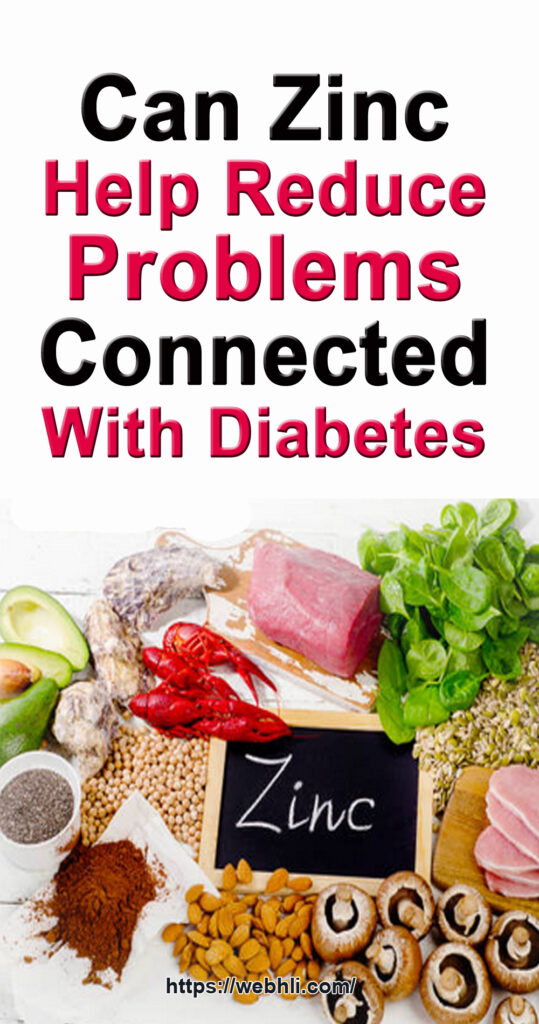
Zinc is an essential mineral for many reasons. It helps your immune system work properly. It helps wounds heal, promotes cell growth and breaks down carbs for energy. It also has antioxidants which protect you from free radicals that can cause numerous problems. It maintains your smell and taste senses and helps cells grow and divide.
Zinc is a mineral your body cannot produce, so you need to get it from food or through supplements if you don't eat enough healthy foods. Zinc is found in eggs, nuts, whole grains, meat, shellfish, oysters, canned fish, liver, hard cheese, poultry and pulses. Vegetables contain small amounts of zinc as well as compounds such as oxylates and phytates that bind zinc... which means there's less available for your body to absorb.
Check out these related articles, too:
Minerals That Lower Blood Glucose
Skin Problems Connected to Diabetes
What is the biggest contributor to diabetes?
Diabetes and Higher Than Normal Fasting Blood Sugar Levels
How to Lower Blood Sugar Naturally
Using a Diabetic Blood Sugar Level Chart How to Know If You're in a Normal Range
Zinc is stored in your kidneys, bones, muscles, pancreas, skin, retina of your eyes, blood cells, liver and prostate (men). People with diabetes tend to be lacking in zinc and therefore need to increase their intake, either through food or by taking supplements. It is advised you should have a minimum of 15 mgs of zinc daily and a maximum of 40 mgs.
People who have diabetes lose zinc through their urine... diabetics often urinate more frequently than non-diabetics. Zinc helps prevent the destruction of the beta cells. If you lack this mineral, the cells in your pancreas cannot effectively produce enough insulin to help control your blood sugar and low levels of zinc make you less sensitive to insulin.
This means your blood sugar is likely to remain at high levels unless further action is taken to correct this imbalance. You may need to take insulin to reduce your blood sugar if you are not already doing this. If you have sufficient zinc in your system, it also helps wounds heal faster and can help you recover from a heart attack faster than if your levels were low.
Symptoms of a zinc deficiency include:
- weight loss,
- mild anemia,
- loss of your senses of smell and taste,
- recurring yeast or bacterial infections,
- night blindness,
- sleep problems,
- loss of appetite (possibly leading to anorexia),
- slow wound healing,
- stunted growth in young children,
- nasal polyps,
- abdominal pain,
- depression,
- rheumatoid arthritis,
- diarrhea,
- hair loss and dandruff.
Just because this is a long list of problems, it doesn't mean you should run out and buy supplements. You should consult your doctor first as having too much zinc can also cause problems including:
- unbalanced iron and copper levels which can lead to a weakening of your immune system,
- vomiting,
- nausea,
- a drop in the good cholesterol, and
- a weakening in your immune system.
It can impede the effectiveness of numerous other medications including antibiotics, corticosteroids, ACE inhibitors and others. The best option is to get sufficient zinc from your food but if you think you need supplements, check with your doctor as he knows your history; he can decided whether it's necessary or not to add supplements.
Type 2 diabetes is no longer a condition you must just live with. By making easy changes to your daily routine, its possible to protect your heart, kidneys, eyes and limbs from the damage often caused by diabetes, and eliminate some of the complications you may already experience.
For nearly 25 years Beverleigh Piepers has searched for and found a number of secrets to help you build a healthy body.
The answer isn't in the endless volumes of available information but in yourself.
Article Source: http://EzineArticles.com/7699027



 Protected by Patchstack
Protected by Patchstack